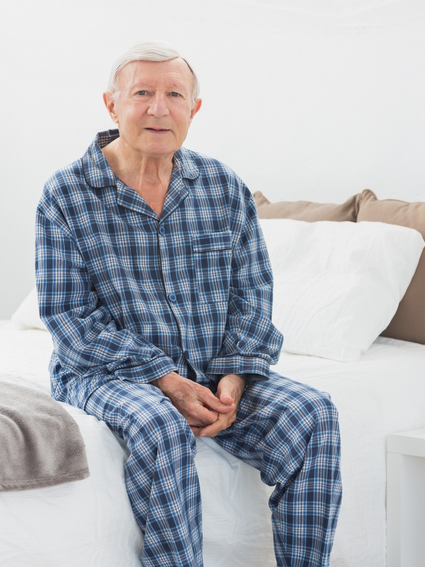December 1, 2022
TOWARDS A BETTER NIGHT’S SLEEP
UNDERSTANDING SLEEP AND DEMENTIA

A Synergistic Effect
Poor sleep and dementia intertwine, each contributing to the other:
Poor sleep increases the risk of dementia —>
- There is a correlation between sleep-disordered breathing (SDB) and cognitive decline
- Studies show that the brain gets “washed” during sleep
- Treatment of SDB and insomnia can reduce one’s risk of dementia
<— Dementia increases the risk of sleep disturbance
- Early in the disease process, people experience a disruption of sleep/wake cycles (circadian rhythm) and agitation close to bedtime
- Studies have shown that decreased light, daily activities caused by cognitive decline and vision loss may also contribute to disrupted sleep/wake cycles
Up to 60% of individuals with Alzheimer’s disease report sleep disruptions, including insomnia, hypersomnia, days and nights reversed, nighttime waking, reduced overall sleep, and sleep-disordered breathing.
People with dementia might also experience a phenomenon in the evening or during the night called sun downing – exhibiting confusion, agitation, anxiety, or aggressive behavior. Night wandering while in this state of mind can be especially unsafe.
Sleep disturbances tend to worsen as dementia progresses in severity.
A Word About Caregiving
A restless loved one disrupts sleep for the caregiver as well – taking a significant toll on the well-being of both. Of the >10 million family caregivers in the U.S., two-thirds report their own sleep disturbances, caused by:
- Disrupted daytime and nighttime routines
- Caregiver burden
- Declining health
If you’re not getting enough sleep, you might find yourself lacking the patience and energy needed to care for someone with dementia; and, sensing your stress, your loved one might become increasingly agitated too.
If possible, have family members or friends alternate nights with you; or consider taking advantage of Respite Care services like those offered by Winter Growth. Talk with your doctor, a social worker, or a representative from a local Alzheimer’s Association to find out what help is available in your area.
Remember, taking care of yourself, including maintaining or rediscovering activities that bring you joy, is one of the most important things you can do as a caregiver.
Supporting Better Sleep
Many factors contribute to sleep disturbances. Reducing those that are modifiable, such as managing pain, treating chronic illnesses, avoiding polypharmacy (the use of multiple medications), and boosting daytime activity can have a positive effect on sleep.
Consider the following tips:
- Treat underlying conditions. Sometimes conditions such as depression, sleep apnea, or restless legs syndrome cause sleep problems.
- Establish a routine. Maintain regular times for eating, waking, and going to bed.
- Avoid stimulants. Alcohol, caffeine, and nicotine can interfere with sleep. Limit use of these substances, especially at night. Also, avoid turning on the TV during periods of wakefulness at night.
- Encourage physical activity. Walks and other physical activities during the day can help promote better sleep at night.
- Limit daytime sleep. Discourage afternoon napping.
- Set a peaceful mood in the evening. Help your loved one relax by reading out loud or playing soothing music. A comfortable bedroom temperature can help individuals with dementia sleep well.
- Discuss medications with your loved one’s doctor. Some antidepressant medications, such as bupropion and venlafaxine, have been linked to insomnia. Cholinesterase inhibitors, such as donepezil, might improve cognitive and behavioral symptoms in people with Alzheimer’s but might also affect sleep. If the person with dementia is taking these kinds of medications, talk to the doctor. Administering the medication no later than the evening meal often helps.
If nondrug approaches aren’t working, the doctor might recommend sleep-inducing medications. But, sleep-inducing medications increase the risk of falls and confusion, especially in older adults who are cognitively impaired. As a result, sedating sleep medications generally aren’t recommended for this population. If these medications are prescribed, the doctor will likely recommend attempting to discontinue use once a regular sleep pattern is established.
- Consider melatonin. Melatonin might help improve sleep and reduce sun downing in people with dementia. Check with your loved one’s doctor regarding this option.
- Provide proper light. Bright light therapy in the evening can lessen sleep-wake cycle disturbances in people with dementia. Adequate lighting at night can also reduce agitation that occurs when surroundings are dark. Regular daylight exposure might address day and night reversal problems.
When a Loved One Wakes During the Night
If the person with dementia wakes during the night, stay calm – even though you might be exhausted yourself. Don’t argue. Arguing may escalate a loved one’s anxiety. Instead, ask what the person needs. Nighttime agitation might be caused by discomfort or pain. Calmly and slowly investigate to determine the source of the problem, such as constipation, a full bladder, or a room that’s too hot or cold.
Gently remind him/her that it’s night and time for sleep. If the person needs to pace, don’t restrain him/her. Instead, allow it under your supervision.
Two Takeaways
While sleep challenges may evolve along the course of dementia, there are many effective nonpharmacological and pharmacological treatment approaches to reducing sleep disturbances. Remember….taking care of yourself enables you to take care of your loved one.
Resources:
DementiaWise /BLB Webinar
Harvard Health Publishing/Harvard Medical School
Mayo Clinic/ Alzheimer’s: Managing Sleep Problems
Enjoy the article? Be sure to Subscribe to Winter Growth’s Live Joyfully Blog to receive a notification when new posts are available!

Winter Growth’s founder dreamed of creating a community where seniors and adults with disabilities could continue to learn and grow – filling their lives with joy and purpose. For over 40 years, we have fulfilled her vision by providing unique, affordable Assisted Living/Memory Care and Adult Medical Day Care tailored to our clients’ individual abilities, interests, and lives.

